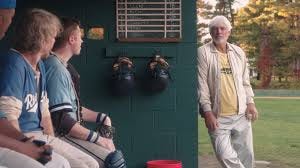As the sci-fi/horror hybrid Ash begins, astronaut Riya (Eliza Gonzalez), on a mission into deep space to investigate faraway planets suitable for colonization, looking on in horror as she regard the messy remains of most of her crew members, whose heads appears to have been either blown apart or caved in, with no memory of what might have happened. Assuming that she did not do it, and she cannot completely rule herself out, there are perhaps two other suspects—Clarke (Kate Elliott), the only remaining, and currently missing, member of the crew and Brion (Aaron Paul), who says that he has come from a nearby space station to check out distress signals and who warns of possible dangers to be had if they stay. Nevertheless, Riya is compelled to investigate to try to piece together what happened and, suffice it to say, there comes the possibility that there may be something else about (the ship’s computer is constantly warning of “abnormal activity”) as the truth about what happened slowly and messily comes into focus, more or less.
Directed by Flying Lotus—whose previous credits include the gross-out would-be cult favorite Kuso and the weakest section of the anthology film V/H/S/99–Ash, as you have probably figured out by this point, is little more than a riff on the still-potent classic Alien. Actually, that is giving the film way too much credit—it feels more indebted to the string of low-budget rip-offs that emerged in that film’s wake that realized that they could never replicate the tension or surprise that Ridley Scott was able to deliver and instead chose to amp up the gore factor instead. Lotus (who also appears as one of the hapless crew members) tries to disguise the lameness of Joni Remmler’s alternately derivative and incoherent screenplay and banality of the characters with lots of surface flash and gore and while the visual style is initially striking, it isn’t interesting enough to sustain the material as it lumbers on to its monotonous and imagination-free finale which proves to be more rib-tickling than spine-chilling. As devoid of life and humanity as the planet where it is set, Ash is a dreary, dull-witted work of pure tedium whose only scientific breakthrough turns out to be violating the time-space continuum by taking a 95-minute run time and making it seem at least three times as long
.Set in the 1990s in a small Massachusetts town, Carson Lund’s delightful directorial debut Eephus depicts the final baseball game of the season between two local recreational-league teams. Mind you, this is not a game that is exactly brimming with tension, excitement or sterling play—a number of the mostly middle-aged players groan whenever a play requires any sort of physical exertion on their parts and the few spectators who happen along tend to regard the game as a curiosity before moving along to other things. However, the unfolding game is significant as it will be the last one on that field before it is paved over as part of an imminent construction project. Faced with the loss of their field, the potential end to their playing and the inevitable fracturing of the relationships that they have forged on the field, the players on both sides, fueled by their undeniable love of the game and what it stands for, contrive to find ways to stretch it out for as long as possible, to the point where the guys are forced to turn on their car lights in order to provide barely enough illumination for the final outs.
Eephus—the title refers to a rare and notoriously difficult pitch—is a lovely and absolutely wonderful film but it is the kind that is hard to recommend to people because so little of dramatic import happens during it that some viewers may find themselves growing restless after a while. This is not the kind of sports movie in which everything revolves around who wins and who loses. Instead, it is closer in spirit in tone to the films of Robert Altman and Richard Linklater in the way that it is less interested in balls and strikes than in observing the interactions of the various players as they gently razz each other while pondering what they will do once the game is over, both literally and metaphorically. (The ensemble cast is perfect and the fact that it manages to include both legendary documentarian Frederick Wiseman and the famously oddball 70s-era pitcher Bill “Spaceman” Lee should give some idea as to the film’s offbeat charms.) Lund also does an excellent job of convincingly evoking the atmosphere of such a small-stakes game, offering up its little details with such precision and nuance that there are times when it feels as if we are watching a documentary. Even if you don’t have much of a working interest in baseball in general, Eephus is still a marvelously humane charmer of a film that contains a lot of big laughs throughout as well as more quietly moving ones that underscore the basic concept of life itself being like a baseball game—neither one has a finite time limit but both can end in an instant—without being overly precious about it. If you are a fan of the game, however, it is an absolute must-see and an instant addition to the list of the all-time great title in the annals of baseball cinema
.Eddie (Bill Skarsgard), the central character of the new thriller Locked, is an irresponsible goof who is struggling to prove to his ex-wife and daughter that he can indeed be a responsible parent, even when the simple act of picking up the latter after school seems to be too much for him. Desperate for money to pay for the repairs to his van to allow him to accomplish this, he starts looking for cars to loot for quick cash when he happens upon an expensive-looking SUV with an unlocked door. Unfortunately for him, when he tries to get out of it, he discovers that he is locked inside with seemingly no way of escaping. It turns out that the car belongs to William (Anthony Hopkins), a man with a few months to live, billions of dollars at his disposal and axes to grind against a society that he blames for the condition of the world in general and the murder of his beloved daughter during the course of a robbery in particular. Communicating with Eddie via the dashboard, we learn that he has had the SUV tricked out to serve as a virtual prison for anyone unlucky enough to happen into it—soundproofed, bulletproofed and with a barrier preventing WiFi and phone service for starters. Over the course of several days, William offers his victim a variety of tortures ranging from electric shocks from the seats to excessive heat/air conditioning to yodeling recordings played at ear-splitting levels while at the same time lecturing him at length about all the illnesses of the world that he believes Eddie to represent, while his victim struggles to figure a way to escape his predicament and—more importantly—pick up his daughter from school and not let her down for once.
If the basic premise of Locked sounds vaguely familiar to you, then perhaps you happened to see 4X4, the 2019 Argentinian thriller on which it is based. That film was not exactly a masterpiece by any means but it took its preposterous premise and spun it out into a reasonably engrossing and effective thriller for most of its running time. This version, which includes Sam Raimi among its many credited producers, has the same concept but runs out of gas much earlier. For starters, while the original film managed to figure out ways so that you could find some empathy for the two characters, Michael Arlen Ross’s seems at times to be going out of its way to ensure that both are as unsympathetic as can be. Even when grievously injured and reduced to drinking his own urine, Eddie always comes across as a jerk throughout (which Skarsgard does commit to through his performance) while William is even more off-putting with his endless droning about the downfall of civilization thanks to all those pesky poor people who have leeched off of society for so long that it is up to people like him (i.e. the rich) to set things right on their own. That is irritating enough on its own but what makes this aspect even more off-putting are the moments when Ross and director David Yarovesky seem to be endorsing William’s equally selfish and self-absorbed moneyed mindset—an approach that might have paid off if they had been willing to grapple with it instead of abandoning it for a third act that goes into increasingly silly action overload. Even at a relatively brisk 95 minutes, Locked is a cynical and ultimately tedious work that takes its undeniably grabby premise and then demonstrates absolutely no idea of how to make it work, a crime unforgivable to earn the filmmakers a ride in their vehicle’s vehicle for themselves
.This week happens to mark the 50th anniversary of the release of Tommy, Ken Russell’s cheerfully deranged visualization of The Who’s landmark rock opera of the same name that is still crazy after all these decades and a film that sticks in your mind long after you finish watching it, no matter how much you may yearn to dislodge it. By sheer happenstance—at least one hopes—this week also sees the release of O’Dessa, a brand new rock opera that tries to blow minds in much the same way that Russell did but pretty much fails of nearly every level. Set in a semi-post-apocalyptic world in which most of the populace is glued to the constantly televised actions of its de facto leader, Plutonovich (Murray Bartlett), the sleazy host of a game show that is like America’s Got Talent with a body count (subtlety is one of the many things that is not a strong point here), Sadie Sink stars as O’Dessa, a young woman from the sticks who comes from a long line of traveling musicians who plays a magical guitar inherited from her late father and who, according to some vague prophecy, is destined to sing a song with the power to change the world. Following the death of her mother, O’Dessa sets out to achieve her destiny, only to have her precious guitar stolen on her first night out by a band of thieves. Her pursuit of her prized guitar leads her to Satylite City, a garish industrial hellscape where she falls in love with fellow singer Euri (Kelvin Harrison Jr), runs afoul of local crime boss Neon Dion (Regina Hall in a truly baffling turn) and eventually finds herself facing Plutonovich with the potential fate of what remains of mankind hanging in the balance.
The film was written and directed by Geremy Jasper, whose previous film, Patti Cake$, told another story of a downtrodden young woman trying to find her place in the world via music, and while I did not particularly care for that movie, it feels like a near-masterpiece compared to this mess, which feels as if he deliberately set out to make the contemporary equivalent of the notoriously garish futuristic rock musical The Apple and has unfortunately succeeded in that dubious task. The narrative about O’dessa setting out to seek her destiny is barely established before it is mostly abandoned to focus on the love affair between her and Euri, who comes across here like the love child of Chris Tucker’s character from The Fifth Element. Considering how uninteresting that storyline is, this might have been a relief except for the fact that the romance completely fizzles due to the lack of any convincing chemistry between the two, who seem to be together only because the screenplay dictates it. Meanwhile, the tone shifts wildly between fumbled attempts at camp and equally embarrassing stabs at sincerity that leave the actors, especially Hall, seemingly unsure of how to play their parts at any given point. Even if you are willing to ignore the plot and just take the whole thing as an extended rock video, it still doesn’t work because the visual style is garish without ever being interesting and the songs performed throughout—a melange of styles ranging from folk to rock supplied by Jasper—are so middling that after watching it, you will want to put an album on in order to drive any lingering traces of it from your mind. That O’Dessa pales in comparison to Tommy is no crime, I suppose—few films in its wake have come close to approximating the sheer lunacy that it demonstrated in every scene. The real problem is that when it comes to the short and strange history of cinematic rock operas, this one fails to surpass the likes of Repo: The Genetic Opera.








Great reviews! Are you reviewing Snow White as well?